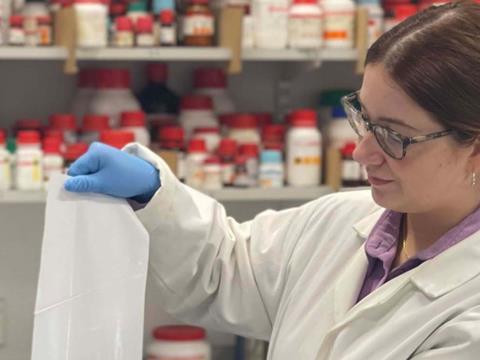
Researchers at Queen’s University Belfast have developed a degradable plastic film with a self-sterilising coating that can kill viruses through the absorption of UV and fluorescent light.
The research, which has been published in the Journal of Photochemistry and Photobiology B: Biology, was carried out by Professor Andrew Mills, Dr Ri Han, and Dr Christopher O’Rourke in the School of Chemistry and Chemical Engineering and Dr Connor Bamford and Dr Jonathon D. Coey at the Wellcome-Wolfson Institute for Experimental Medicine in the School of Medicine, Dentistry and Biomedical Sciences, at Queen’s University Belfast.
According to the researchers, the film is coated with a thin layer of particles that absorb UV light and produce reactive oxygen species (ROS), which kill viruses.
The researchers tested the film for antiviral activity using four different viruses – two strains of influenza A, a highly-stable picornavirus called EMCV, and SARS2, the virus that causes COVID-19 – by exposing it to either UVA radiation or light from a cool white fluorescent lamp. They found that the film is effective at killing all of the viruses, even in a room lit with just white fluorescent tubes.
The researchers say that the technology used to create the film also ensures it is degradable. Additionally, the researchers claim the film is low-cost to produce and can be readily scaled.
Applications for the film reportedly include disposable aprons, tablecloths, and curtains in hospitals. The researchers add that the film could lead to a significant reduction in the transmission of viruses in healthcare environments, as well as in other settings that use plastic films, such as food production factories.
Professor Andrew Mills comments: “This film could replace many of the disposable plastic films used in the healthcare industry as it has the added value of being self-sterilising at no real extra cost. Through rigorous testing we have found that it is effective at killing viruses with just room light – this is the first time that anything like this has been developed and we hope that it will be a huge benefit to society.”
Dr Connor Bamford adds: “Pathogenic viruses like SARS2 and influenza will continue to be a global problem for years to come. In developing self-sterilising thin plastic films, we have created a low-cost technology that could have a significant impact on the transmission of such concerning viruses in a healthcare environment and other sectors where they are used.”
The project was funded by the Engineering and Physical Research Council, which is part of UK Research and Innovation.
Dr Kedar Pandya, director for cross council programmes at ESPRC: “This is a hugely exciting development which has the potential to dramatically reduce the transmission of viruses across a wide range of settings while being environmentally sustainable.
“It is an excellent example of adventurous, innovative research which has the potential to improve the lives of millions of people.”













No comments yet